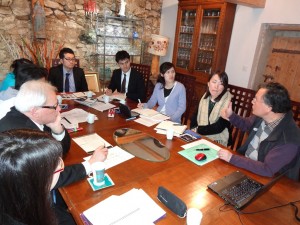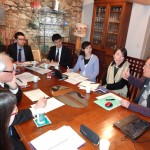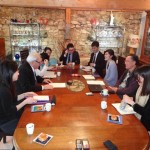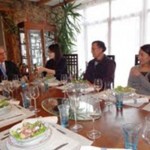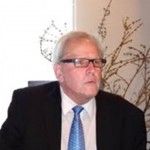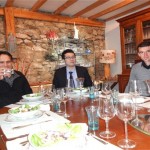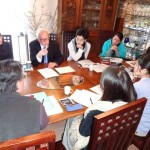From left to right,
Ms. Yui Suzuki, Mr. Alain Dick,
Mr. Hirofumi Yoshitake, Ms. Mio Nakashima,
Mr. Yosuke Sakurai, Mr. Hirotaka Kawakami,
Ms. Ayaka Izu, Ms. Ayako Okamura
and Professor Sukehiro Hasegawa
(Photo: Milan M. Ivanovski)
We participated in a study trip to visit UN organizations in Geneva from March 25th to 29th. On our last day, we had a seminar by Mr. Alain Dick and Professor Hasegawa. They mainly presented about skills and knowledge necessary to work in the international organisations with their experiences in their UN careers and current attempts to develop the structure of international organisations. At the beginning, Mr. Dick explained two core important concepts to build UN career in terms of mind perspective; motivation and communication. In particularly, he strongly emphasized the importance of knowing and understanding “who I am”; in the other words, what I am eager to achieve in both short and long time periods. At the same time, he advised us to understand the aspirations of our partners and gave us examples of the impotence of communication with interviewers as they expect when we apply the international organisation and we move forward in our UN careers.
In his presentation, Professor Hasegawa developed Mr. Dick’s argument more in depth and current international organisation movement. Firstly, he quoted the famous saying by a Chinese philosopher, Sun Tzu’s, Art of War: “If you know yourself and your enemy, then you need not to fear the results of a hundred battles”. Then, to identify our personal characters and preferences, each one of us filled in the questionnaire of “The Keirsey Temperament Sorter” and discussed the result, focusing on the weaknesses of each type of personality. Regarding the competencies, Prof. Hasegawa also emphasized the importance of motivation and communication to achieve the skills of leadership which should be involved with knowledge, will and skills. In addition to the core competencies, he listed managerial competencies including leadership, vision, and empowering others. He also listed different types of leadership, and he especially elaborated strategic and situational leadership which is a capability to set a proper and clear goal and move forward to it while taking into any specific circumstance. Furthermore, Prof. Hasegawa presented us the current movement of the international organisations. It might be true that the system of international organisation has been criticized from the views of lack of cooperation under the limitation of state sovereignty and state interests. However, Prof. Hasegawa showed us a practical on-going example with the new concept of coordination and integration of international organisation structure from the establishment of United Nations Development Group in 1997. Finally, he concluded in his presentation with suggesting to us a disputable question; “why nation-states created international organisations which endeavors to limit their sovereignty and control their behaviors?”. This question might imply his will for future candidates who want to pursue the UN career to keep considering the meaning and the principal roles of international organisations.
Overall, we have learnt two key points from the seminar; the importance of knowing own-self and partners and the challenge of international organisation in order to achieve their fundamental goals with the idea of coordination and integration of their activities and principles. We truly appreciated this opportunity, and the tips given by Mr. Dick and Prof. Hasegawa continue to be helpful when we consider and challenge UN careers.
(Ayaka Izu)

